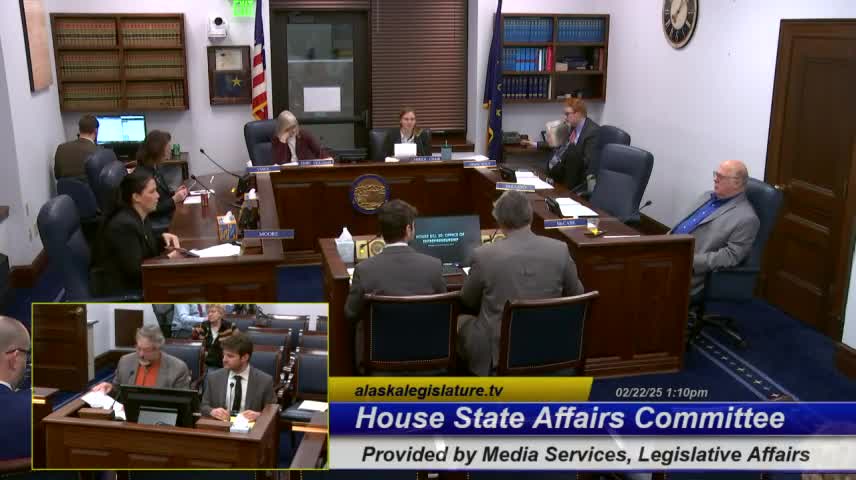House committee hears plan to create Office of Entrepreneurship to coordinate Alaska startup support
Get AI-powered insights, summaries, and transcripts
Subscribe
Summary
Representative Kai Holland introduced House Bill 30 to create an Office of Entrepreneurship inside the Department of Commerce, Community and Economic Development to coordinate statewide startup supports.
Representative Kai Holland introduced House Bill 30 on an Office of Entrepreneurship to the House State Affairs Committee as a way to coordinate Alaska’s fragmented startup supports and accelerate job growth from new firms.
Holland said the office would provide “backbone” support—linking entrepreneurship training, access to capital, and state programs—rather than duplicating existing programs. "We have a very strong entrepreneurship culture and programs in the state. What we're missing is a cohesive strategy to tie this together," Holland said.
The bill would place the office in the Department of Commerce, Community and Economic Development (DCCED) and outline functions such as ecosystem building, ideation support, technical assistance for founders, and alignment of state purchasing and workforce activities with emerging businesses. Holland said the initial fiscal note reflected six positions and associated overhead because DCCED currently has little dedicated economic development capacity; he indicated he expects to revisit staffing levels and a proposed business-license fee waiver in later drafts.
Jason Grill, chief government affairs officer for the national nonprofit Right to Start, testified in support and described practices in other states. "Entrepreneurs create jobs, grow GDP, they create homegrown jobs, and they increase community wealth," Grill said, arguing a state-level office gives entrepreneurs “a front door” to cut red tape and coordinate policies. Grill said other states deploy between one and a few full-time staff for similar offices and recommended a small core team (director, coordinator, data analyst/community builder).
Jared Reynolds, director of the University of Alaska Center for Economic Development, said Alaska has high rates of business formation but lags in growing scalable companies. He said the center’s accelerator programs served more than 60 entrepreneurs and that Alaska “ranks 39th nationally in high-growth density,” a metric he said underscores the difficulty of scaling startups from Alaska’s small and dispersed population.
Committee members pressed on scope and overlap with existing regional economic entities. Representative Vance and others noted Alaska Regional Development organizations (ARDORs) and local economic development corporations already provide startup assistance in their regions. Holland and witnesses said the office is intended to be complementary: it would convene statewide strategy, help the ARDORs access resources, and align state purchasing and workforce programs to create market opportunities for startups.
Members also focused on the bill’s fiscal elements. DCCED director Sylvain Robb (division of corporations, business, and professional licensing) told the committee the current business-license fee is $50 and the division does not track new-business start dates in a way that cleanly supports a targeted waiver; Robb said data limitations contributed to the larger fiscal estimate for administrative work. Holland said he expected to remove or scale back the proposed license fee waiver because of implementation complexity and uncertain programmatic benefit.
Holland framed HB30 as a front-end intervention paired with a complementary strategic bill (House Bill 34). "HB 30 is kind of the microeconomic view of how do we help individual ventures take their next steps to be successful, grow and scale," he said, while HB34 would operate as a strategic innovation council at the macro level.
No committee votes occurred. Members asked for additional material: staff and invited witnesses offered to provide updated data from the University of Alaska State of Entrepreneurship report, DCCED fiscal clarifications, and examples of other states' program staffing and outcomes. Holland said he intends to revise staffing and fiscal elements and to work with the department and ARDORs on implementation details.
The committee set the bill aside for further work and public testimony to follow in subsequent hearings.
